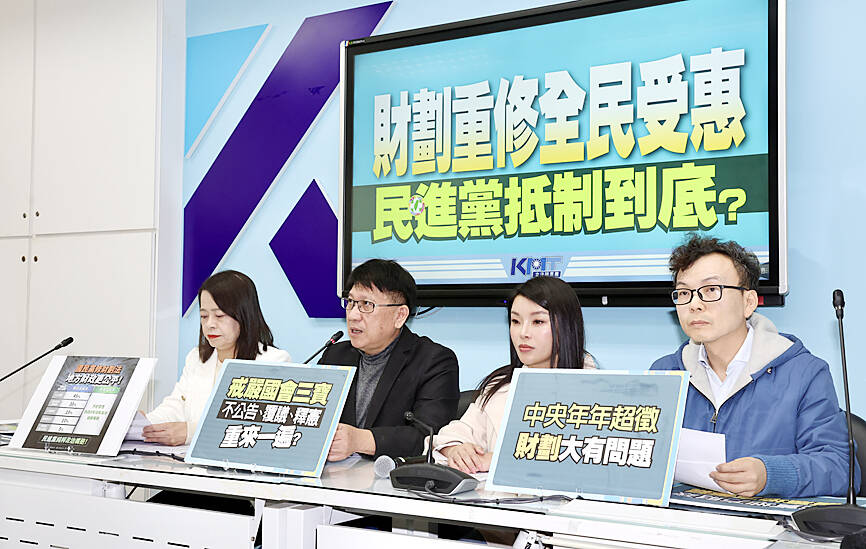The Chinese Nationalist Party (KMT) caucus yesterday defended amendments to the Act Governing the Allocation of Government Revenues and Expenditures (財政收支劃分法) that the ruling Democratic Progressive Party (DPP) said would necessitate an overhaul of the 2025 general budget.
The amendments, if promulgated into law, would allocate 60 percent of available funding to local governments rather than 25 percent, which would result in an annual reduction to central government spending power of NT$375.3 billion (US$11.48 billion), the Directorate-General of Budgeting, Accounting, and Statistics (DGBAS) said.
At a news conference yesterday, KMT caucus secretary-general Lin Szu-ming (林思銘) rejected claims made by government ministers that the revisions, which cleared the legislature on Friday following brawls between lawmakers, would harm central government spending on defense, social welfare and other major programs.

Photo: CNA
Lin said that the reallocation of funding would instead reward fiscally responsible local governments and encourage them to promote economic development and create jobs, rather than relying on central government handouts.
“When President William Lai (賴清德) was mayor of Tainan, he called for amendments to the Act Governing the Allocation of Government Revenues and Expenditures,” Lin said, suggesting that the DPP also sought greater funds for local governments when it previously was in opposition.
“Basically, what [for them] was right yesterday is wrong today,” Lin said. “They changed places and changed their minds.”
DGBAS Minister Chen Shu-tzu (陳淑姿) said the changes would cause “procedural chaos” in relation to the 2025 general budget, which has already been hotly contested by lawmakers in the past few months.
The central government would lose 9 percent of its total revenue if the law goes into effect, Chen said.
That would necessitate massive reductions in spending, including cuts for defense that would be equivalent to a 28 percent reduction, Chen added.

Taiwan has received more than US$70 million in royalties as of the end of last year from developing the F-16V jet as countries worldwide purchase or upgrade to this popular model, government and military officials said on Saturday. Taiwan funded the development of the F-16V jet and ended up the sole investor as other countries withdrew from the program. Now the F-16V is increasingly popular and countries must pay Taiwan a percentage in royalties when they purchase new F-16V aircraft or upgrade older F-16 models. The next five years are expected to be the peak for these royalties, with Taiwan potentially earning

STAY IN YOUR LANE: As the US and Israel attack Iran, the ministry has warned China not to overstep by including Taiwanese citizens in its evacuation orders The Ministry of Foreign Affairs (MOFA) yesterday rebuked a statement by China’s embassy in Israel that it would evacuate Taiwanese holders of Chinese travel documents from Israel amid the latter’s escalating conflict with Iran. Tensions have risen across the Middle East in the wake of US and Israeli airstrikes on Iran beginning Saturday. China subsequently issued an evacuation notice for its citizens. In a news release, the Chinese embassy in Israel said holders of “Taiwan compatriot permits (台胞證)” issued to Taiwanese nationals by Chinese authorities for travel to China — could register for evacuation to Egypt. In Taipei, the ministry yesterday said Taiwan

Taiwan is awaiting official notification from the US regarding the status of the Agreement on Reciprocal Trade (ART) after the US Supreme Court ruled US President Donald Trump's global tariffs unconstitutional. Speaking to reporters before a legislative hearing today, Premier Cho Jung-tai (卓榮泰) said that Taiwan's negotiation team remains focused on ensuring that the bilateral trade deal remains intact despite the legal challenge to Trump's tariff policy. "The US has pledged to notify its trade partners once the subsequent administrative and legal processes are finalized, and that certainly includes Taiwan," Cho said when asked about opposition parties’ doubts that the ART was

If China chose to invade Taiwan tomorrow, it would only have to sever three undersea fiber-optic cable clusters to cause a data blackout, Jason Hsu (許毓仁), a senior fellow at the Hudson Institute and former Chinese Nationalist Party (KMT) legislator, told a US security panel yesterday. In a Taiwan contingency, cable disruption would be one of the earliest preinvasion actions and the signal that escalation had begun, he said, adding that Taiwan’s current cable repair capabilities are insufficient. The US-China Economic and Security Review Commission (USCC) yesterday held a hearing on US-China Competition Under the Sea, with Hsu speaking on